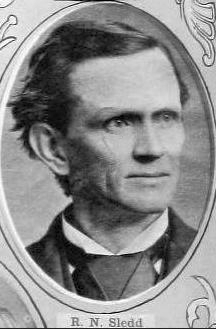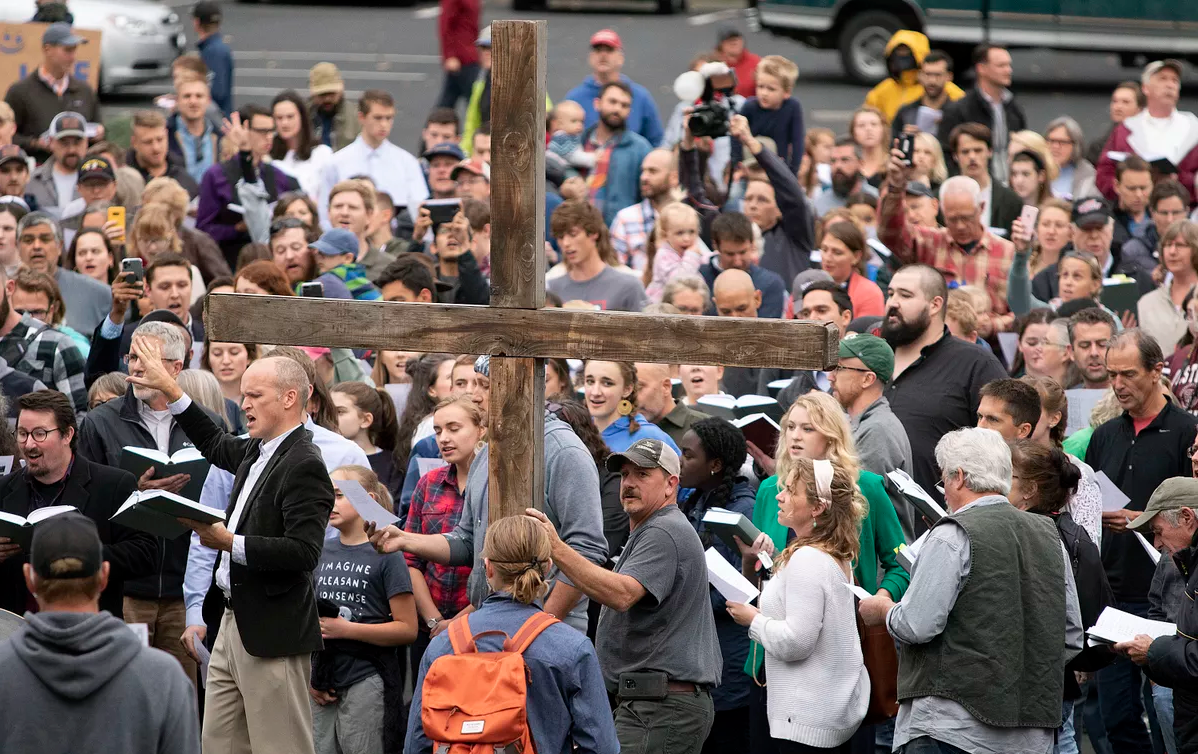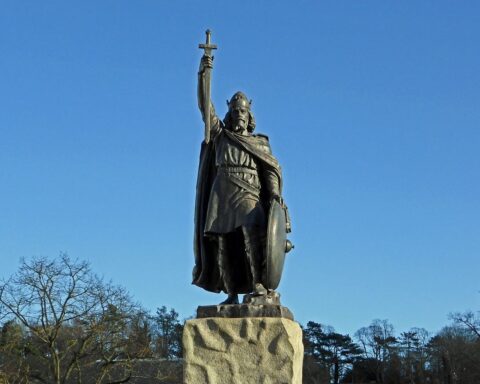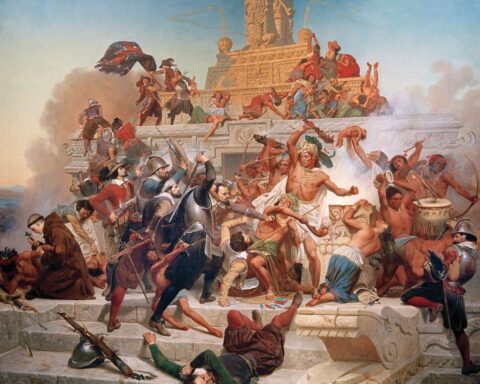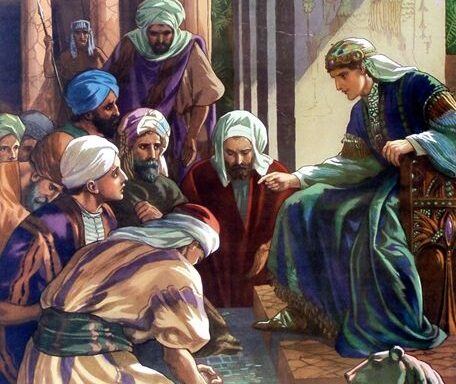Editor’s note: The following is extracted from True Heroism and Other Sermons, by R. N. Sledd (published 1899).
“For Zion’s sake I will not hold my peace, and for Jerusalem’s sake I will not rest, until the righteousness thereof go forth as brightness, and the salvation thereof as a lamp that burneth. And the Gentiles shall see thy righteousness, and all kings thy glory: and thou shalt be called by a new name, which the mouth of the Lord shall name. Thou shalt also be a crown of glory in the hand of the Lord, and a royal diadem in the hand of thy God. Thou shalt no more be termed Forsaken; neither thy land any more be termed Desolate; but thou shalt be called Hephzibah, and thy land Beulah; for the Lord delighteth in thee, and thy land shall be married.” — Isaiah lxii, 1-4.
Zion is the hill or hills on which David built his palace, and a city called after him the city of David. Here also was the site of the tabernacle in which he placed the ark of the Lord, and later, of the temple and other edifices built by Solomon. Jerusalem was the great city adjacent. The two names are often used interchangeably in the Scriptures. The two constituted the civil and religious capital of the nation: the seat of temporal power, and of spiritual light and knowledge, and ceremonial worship.
As Zion was the seat of the worship of the Most High, whence His law should go forth and His glory be revealed, it very naturally came to represent His spiritual church. In the passage before us the prophet is not speaking merely of the literal Zion and Jerusalem. He is looking beyond the visible and temporal to that which they typified, the spiritual and heavenly. As a patriot he loved his country, and could not but desire its welfare. But its highest material prosperity and power in his view dwindled into utter insignificance when compared with the security, enlargement and glory of the church. It is of this that he is thinking, and that is the object of his solicitude.
His solicitude finds expression in ceaseless activity. “It will not rest — I will not hold my peace.” As became his office he would intercede with God without ceasing, and without ceasing instruct, reprove, and warn the people. All the forces of his being, quickened and energized by the inspiring Spirit, were laid upon the altar of the church. He had no time to spare for other interests; no strength to waste, and no heart for anything outside his duty to God and the people. In his constant care, complete devotion, and diligent toil, he furnishes an instructive example not for the ministry only but for every member of the household of faith. It is an example which we will be glad to imitate in proportion to our faith in God and our love for Zion.
His solicitude was altogether unselfish. “For Zion’s sake — for Jerusalem’s sake.” He had no personal ends to gain; no private or family interests to serve. Whatever may become of him and his house, he desires the good of the church. It is God’s Zion, God’s Jerusalem; and as a loving, faithful servant of God, he gives to His church the first place in his heart. He and his are nothing when brought into competition with God and His cause. Thus self is to be lost sight of when the interests of the church are in question. Let God’s cause be taken care of and His name be glorified whatever may become of us and ours.
That for which the prophet was specially solicitous and for which he labored was that the righteousness of the church might “go forth as brightness, and the salvation thereof as a lamp that burneth.”
Righteousness and salvation are inseparable. There cannot be righteousness without salvation as its fruit. There cannot be salvation without righteousness as the tree on which it grows. No one is saved who is not righteous; no one is righteous and yet fails of salvation. Righteousness therefore is the principal thing. This is the key that opens the door of hope and of heaven.
This righteousness is twofold. First, righteousness of character. By this is meant the conformity of the inner life, the hidden man of the heart, to the rule of right, to truth, purity and goodness; thinking, feeling, choosing only in harmony with those immutable principles of rectitude embodied and inculcated in God’s holy word. To fallen nature left to its own resources this righteousness is impossible. God alone can deliver the soul from the bondage of sin, cleanse it of its defilement, and create it anew. This He promises to do for every penitent believer. “From all your filthiness and from all your idols will I cleanse you. A new heart also will I give you, and a new spirit will I put within you.” This promise is fulfilled in the experience of every one whom God accounts righteous. He “puts on the new man, which after God is created in righteousness and true holiness.” In right relations to God, he is right within. Second, righteousness of life. The new life within must manifest itself in new living without. The good tree must show that it is good by bringing forth good fruit. The life must be projected and pursued on right lines, inspired by right motives, look to right ends. There must be no failure at either of these points. Such failure will discredit and nullify the work of the Spirit within. These two, the inner and the outer, cannot be disjoined. Righteousness of life without righteousness of character is phariseeism, in God’s sight a whited sepulchre. Righteousness of character with out righteousness of life, like faith without works, is dead, being alone.
This righteousness is exclusive. It is separation from all works and workers of iniquity. Its lines are sharply drawn. Its conditions and limitations are distinctly defined. There is no border-land, no neutral ground on which righteousness and unrighteousness may meet and mingle, or where one shades off into the other. To dally with sin, or look with favor or toleration upon it, is to forfeit righteous character, and is disloyalty to our righteous King.
It was the prophet’s supreme desire, and the end at which he aimed, that this righteousness of the church should be conspicuous; that it should “go forth as brightness,” as the sun when shining in its strength. In his day the true glory of the church was to a sad extent eclipsed. Nor can we say the same is not true of our day. It is neither all light nor all darkness, but twilight; whether the morning or evening twilight, forerunner of glad sunshine or of black night, the future will decide. This state is the result, no doubt, in part of the church’s failure to comprehend fully her high privilege and mission. But it is due to a far greater extent to conformity to the spirit, maxims, and principles of the world. Those who claim to be the servants of God, often seem to vie with His enemies in the attempt to obliterate the line which the Holy One has drawn between light and darkness, good and evil, and to bring Christ and Belial, holiness and sin, into loving accord and fellowship. Thus is the church wounded in the house of her so-called friends. Laying her head upon the lap of those who profess to love her, listening to their honeyed words and yielding to their blandishments, she is shorn of her strength and glory, and becomes the sport and derision of her foes.
The highest glory of the church is her spotless purity; her righteousness in character and righteousness in life; all her parts, and powers, and movements, vitalized and transfused with the Spirit and life of her Lord, the incarnation and reflection of His glory. The most conspicuous figure in the world’s history is Jesus of Nazareth; and the most conspicuous element in His character and life is His immaculate purity. If His enemies could point out any stain upon His character or any obliquity in His life, their triumph would be complete. We would feel that His glory was gone, and with it the foundations of our faith and hope. The church is His body, the “fulness of Him that filleth all in all.” It is the visible manifestation of Christ to the world. In and through the church He lives and moves among men and carries forward the great enterprises of His grace. By the church He proposes to subdue all things unto Himself. Let the righteousness of the body like that of the glorious head, “go forth as brightness.” Let it not be obscured by the dark spots of pride, self-righteousness, love of the world, toleration of sin, sloth and indifference. Let the purity of the church be pronounced, uncompromising, conspicuous like the sun in mid-heaven. This is its highest privilege, its mission and glory.
The prophet foresaw splendid results following such an exhibition of the righteousness of the church. When it is in a backslidden state, cold and formal, pervaded and dominated by a worldly spirit, the ungodly may well ask, as often unfortunately they find occasion to do. Wherein are church people any better than others? Wherein is the church any better than the benevolent orders, or even as good as some of them? But let the church be adorned with the holiness that becomes God’s house forever; let it be pure within and pure without, and there will be no room for doubt, or question, or comparison. Who thinks of asking whether the sun is shining at mid day? Or who thinks of comparing his splendor with the light of the moon or the twinkle of a distant star? A few years ago a parliament of religions was held in which there were discussions of the relative merits of the great religious systems of the world. Such a parliament would have been impossible if the church of Christ had never compromised itself or its Lord by worldly conformity. It marks a sad decline from what Christ designed and provided that His church should be when it admits any other system whatsoever into comparison or competition with it. If the righteousness of the church had always gone forth as brightness, pure and untarnished, the Gentiles would have seen it, and all kings would have done obeisance to its majesty. The self-evidencing power and glory of the church would have forbidden any questioning as to the supreme excellence and divine authority of the religion of Christ. Let the church be, as is its privilege, like our blessed Head, “holy, harmless, undefiled, and separate from sinners,” and “the Gentiles will hasten to her light, and kings to the brightness of her rising.” The great obstacle in the way of the salvation of the world is the unrighteousness of the church — its failure to heed the voice, drink into the spirit, follow in the footsteps, and be controlled absolutely by the precepts of Jesus Christ. If the people called after His name will but “stand in the ways, and see, and ask for the old paths, where is the good way, and walk therein,” the forces of heathenism would quickly melt away before them and the kingdoms of this world become the kingdoms of our God and His Christ.
The church, righteous in character and demonstrating its righteousness by holy living, in addition to its might as an agency for the conversion of the world, shall be the joy and rejoicing of her King. “Thou shalt be a crown of glory in the hand of the Lord, and a royal diadem in the hand of thy God.” “Not on His head,” says Matthew Henry, “as adding any real honor or power to Him, as crowns do to those who are crowned with them, but in His hand, as a glory and a beauty to Him” — in His hand, as some thing to be admired for its beauty and prized for its value. In all the universe there is no beauty comparable to the beauty of holiness. We cannot withhold our admiration from the beautiful in nature, in art and in literature; but in moral and spiritual beauty our admiration deepens into veneration. Men may stand erect while they look upon the heavens, “clad in the beauty of a thousand stars,” or while they contemplate the fairest creations of human genius”; but they uncover their heads, and their hearts pay the tribute of their homage to exalted purity and goodness. In the church, “clothed with the garments of salvation,” “arrayed in fine linen, clean and white, which is the righteousness of the saints,” whatsoever things are pure, and good, and true, have their highest and most complete expression. All glorious within, it is all beautiful without. And as there is no beauty that equals that of the church, so in all the universe there is nothing that cost so much, nothing on which infinite love has set so high a value. The eternal Son gave Himself for it; not the beasts of the field and the cattle upon a thousand hills, and the birds of the air, but Himself; not mountains of gold or diamond worlds, but Himself; not one or many of the shining ones, untainted by sin, that ever waited before Him hearkening to the voice of His word, but Himself. We cannot grasp all the meaning of the selfhood of Christ. As divine, He gave His infinite perfection to the task of working out to a successful issue the scheme of redemption — rescuing the perishing, cleansing and keeping believers, guiding and governing the church and glorifying the redeemed in heaven; as human, he gave Himself to poverty and toil, to persecution, reproach and sorrow, to buffeting, mocking and stripes, to the agony of Gethsemane and the desolation and death of the cross. He gave Himself, His whole self, for the church. It was born of the travail of His soul. The heartbreaking cries that come to us from Gethsemane and Calvary were its birth-throes. Born of His death it lives in His life. In its purity, triumphs, and final glory He is satisfied.
Precious in the sight of God because of her righteousness, she is “called by a new name, which the mouth of Lord shall name.” The chosen people had been called rebels and traitors, idolaters and spiritual adulterers. Her enemies in derision had named her Desolate, Forsaken. There are no sadder words known to human speech — none expressive of keener reproach or deeper woe. Forsaken! Friendship’s ties all sundered; the light and love of other days all gone; the harpstrings all broken and the melodies of the soul all dead; nothing but the cold ashes of love and hope on the altar of the heart! A forsaken church! God’s presence withdrawn; the angelic cohorts no longer marshalled for her defence; the Spirit no longer inspiring her services or guiding her movements; the living fire no longer burning on her altars; cold, formal, dead, she is the sport of the scoffer and the easy prey of the spoiler. But “thou shalt no more be termed, Forsaken.” Having put away the sins that provoked God to hide His face from her, and having put on righteousness, the old names of reproach shall be forgotten, and she have a name significant of her new state and relation. What shall that name be? The early followers of Jesus called each other, brethren, believers, saints, disciples, Christians. God gave them a yet higher designation, calling them a chosen generation, a royal priesthood, an holy nation, a peculiar people. But none of these titles give full expression to the tenderness of His love for the church. Nor is there any word, or form of words, that can give us more than a faint conception of that love. To give us the clearest and highest possible conception of it, He compares it to the tenderest, dearest, and most intimate of all earthly relationships. “Thou shalt be called Hephzibah, and thy land Beulah; for the Lord delighteth in thee, and thy land shall be married.” Hephzibah means my pleasure, my delight; Beulah means married. The two words together convey the thought that God marries the church to Himself and delights in her as His spouse. “As the bridegroom rejoiceth over the bride, so shall thy God rejoice over thee.” This representation of the relation between God and the church is not peculiar to Isaiah. It is common to the Bible. One entire Book, the Song of Solomon, is founded on this idea: Christ, or God in Christ, the Husband of the church. In the parable of the Ten Virgins, and in other places in the New Testament, Christ represents Himself as the Bridegroom, and in the Book of Revelation the church is called “the bride, the Lamb’s wife.”
How sacred the obligation imposed by this relation. If Caesar’s wife must be above suspicion, what of the bride of Christ? Would it not be monstrous in her to subject herself to the slightest suspicion of unfaithfulness and impurity? How can she stop for a moment to listen to the enticing words of the world? No language is too strong in which to express our reprobation of the unfaithful wife, the betrayer of the trust and honor of her husband. She wrecks his hopes, disgraces his name, and destroys his home. She deserves the disgust and spurning of every lover of truth and virtue. What then is to be thought of those who, with the vows of fidelity and love to Christ upon them, deliberately seek the embraces of the world? If there is any obligation laid upon any one to be “holy and without blemish,” surely it rests with infinite force upon the spouse of Christ, the church. If there is anything that will awaken His wrath, surely He will whet His glittering sword, and His hand will take hold on judgment, and He will render vengeance to those who, heedless of their plighted troth, trample His honor and His love under their feet.
There is a blessedness beyond conception in this relation to Christ for all who, by righteousness of character and life, are faithful to the obligation it imposes. In Christ is all created and uncreated loveliness and excellence. “Fairer than children of men,” “He is altogether lovely.” He is the perfection of beauty, of truth, and goodness. He is love itself. The love of a mother for her babe is but the shadow of His love for His people. It is as changeless and illimitable as His being, and “free and faithful, strong as death.” And all the wealth of this love He lavishes upon the church. Nor does He withhold from her the knowledge of His love. In words, uttered in tones sweeter than were ever struck from angelic harp; in acts of tenderness and watchful care; by tokens innumerable, which cannot be misunderstood, does He assure her that His love is hers. In this assurance is ” joy unspeakable and full of glory,” Many of us can recall the time when this assurance was first whispered in our hearts. How sweet the peace, how deep the joy, how rich the blessedness of that hour. How worthless are all earthly pleasures when compared with the gladness that fills and thrills the soul assured of the love of Jesus. They, at their best, are but for a season, this is permanent; they leave an aching void in the soul, this fills all its powers and satisfies all its cravings. Happy beyond description the bride of Christ in the love of her Lord.
As He is everything to the church, so the church is everything to Him. She is His delight. He rejoices in her purity and beauty. Her security and welfare is the end of His toil and suffering, His intercession and mediatorial reign. The Father has given Him to be the head over all things to the church; “angels and authorities and powers being made subject to Him.” These higher order of being are “all ministers of His that do His pleasure.” They execute the behests of His love to the church, or of judgment on her foes. Her enemies are His enemies. Whatever affects her interests or happiness is His care. Is she in the wilderness? In the pillar of cloud by day and of fire by night she has the token of His presence and the pledge of His protection. He gives her bread from heaven and water from the rock for her support and refreshment. Is she beleaguered and threatened with destruction by her foes? In the silence of the night, His angel enters the camp of the alien host, and, lo!
At sunrise that host lay scattered and strewn
Like the leaves of the forest when autumn hath blown.
He is her refuge and strength, her very present help in trouble. Therefore she need not fear anything that human or hellish hate can do. No weapon that is formed against her shall prosper. He shall reign until the last of her foes and His shall have been destroyed. Then He will “present her to Himself a glorious church, not having spot or wrinkle or any such thing.”
Then will come the day for which all other days were made, the bridal day of the Lamb. For this all the movements of providence in human history has been making preparation. To this, redemption in all the successive stages of its unfolding and application has been looking as its consummation. For this, her Lord has been, and is still preparing. He left her with the loving word, “I go to prepare a place for you. And if I go and prepare a place for you, I will come again and receive you to myself, that where I am there ye may be also.” Through the ages she has been waiting and watching for the fulfillment of these precious words, sometimes in her weariness of toil and strife, saying, “My Lord delayeth His coming,” and ofttimes crying, “Lord Jesus come quickly.” The hour has come at last. “And I heard it as it were the voice of a great multitude, and as the voice of many waters, and as the voice of mighty thunderings, saying, Alleluia: for the Lord God omnipotent reigneth. Let us be glad and rejoice, and give honor to Him: for the marriage of the Lamb is come, and His wife hath made herself ready.” From all parts of His virtuous empire come the sons of immortality, the magnates of creation, all thrilling with tender, joyous expectation, and eager to join in the celebration of His triumph and her coronation. Heralded by the great archangel’s trump, attended by myriads of shining ones, He comes for His bride. She is looking for Him. She is ready. The last earth stain has been washed away, and the last trace of sorrow and care has been smoothed from her brow. She is arrayed in white robes — bridal attire — robes that have been washed and made white in the blood of the Lamb. Her Lord, looking upon her, says, “Thou art all fair my love; there is no spot in thee.” How ineffably tender His words and her responding look of love. The celestial glory itself is made more glorious by the light of her eyes, as she looks her love into His loving face. And now farewell forever to the scene of her sorrow and tears, of struggle and suffering. Farewell to death and “the ghastly ruins of the mouldering grave.”
Welcome, eternity,
Welcome, O loved and blest,
Welcome, sweet scenes of rest,
Welcome, my Saviour’s breast;
Jesus is mine.
Leaning on the arm of her Beloved, she passes through the gates of pearl. The eternal Father welcomes her home. Amid songs and shouting such as heaven never heard before, she sits down with the Son in His throne, even as He has overcome is set down with His Father in His throne — the delight and glory of her Redeemer forever.
In conclusion: If the successful prosecution of the church’s mission to the world depends on her righteousness; if her greatest beauty and highest value is in her righteousness; if dignity so illustrious and a destiny so glorious is to be the final reward of her righteousness; is there not abundant reason for the prophet’s solicitude? And is there not reason why every lover of Zion should share in this solicitude? We cannot be too anxious, too zealous, or too active in our efforts to maintain and promote the purity of the church. We cannot too deeply deplore the prevalence of the worldly spirit in her ranks; the toleration of sin often in its most subtle and deadly forms; and her failure to appreciate and apprehend in its fulness and glory that for which she is apprehended of Christ Jesus. “Awake, awake; put on thy strength, O Zion; put on thy beautiful garments, O Jerusalem, the holy city.” Banish from thy hallowed pale the “uncircumcised and the unclean.” These are spots that stain thy robes, blotches that deface thy beauty.
